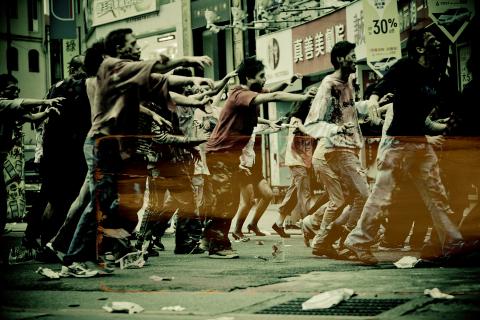Billed as the very first Taiwanese zombie movie, Zombie 108 (棄城Z-108) has generated lots of buzz among horror aficionados both at home and abroad. Nearly 900 people reportedly answered director Joe Chien’s (錢人豪) call to invest in the flick, whose budget clocked in at around NT$10 million. Later, two important players in the genre circuit, the Brussels International Fantastic Film Festival and Puchon International Fantastic Film Festival, picked the movie as part of their lineups this year.
With a more than adequate beginning that recalls many blockbusters of its kind, the self-proclaimed horror B-movie gets off to a good start. Yet the momentum soon dissipates as the movie struggles to flesh out its story.
The film starts with a familiar premise. There is a virus breakout, which is suggested in a sketchy opening sequence. And the next thing we know, Ximending becomes a zombie-infected neighborhood under quarantine. A SWAT team moves in to contain the situation in the seedy downtown area run by local gangs whose obese boss, played by Morris Rong (戎祥), the film’s producer, spends his days surrounded by cocaine and naked women. After a gunfight, the cops and gangsters form an uneasy alliance as they try to survive the flesh-eating undead.

Photo courtesy of Heyshine International
Meanwhile, young mother Linda (Yvonne Yao, 姚采穎) escapes the undead horde with her daughter but falls prey to a pervert, played by director Chien himself, who holds women as sex slaves in his basement.
Eventually, the survivors turn up at the pervert‘s apartment. A Japanese serial killer is thrown in for good measure.
To director Chien’s credit, the zombie assault scenes are well played out. There is also a good deal of gore and blood, though not quite as exciting as many horror fans would expect.

Photo courtesy of Heyshine International
The action sequences are enlivened with parkour and martial arts moves by Taiwanese taekwondo athlete Chu Mu-yen (朱木炎) and martial artist-turned-actor Dennis To (杜宇航) from Hong Kong, both playing SWAT cops. The idea of incorporating extreme sports and kung fu into the fight against zombies has great potential. But the film doesn’t take advantage of this and instead confines itself to a poorly written script revolving around a bevy of mostly dull characters.
The role of women in the zombie action is mostly utilized for torture porn sequences, and the casualness of the sexploitation is hard to stomach.
After making several unsuccessful genre flicks, including Button Man (鈕扣人) and Gangster Rock (混混天團), director Chien seems to be heading in the right direction, into B-movie territory, but he will need to deploy a lot more ingenuity than he shows in Zombie 108 to become a notable filmmaker of trashy movies.

May 18 to May 24 Pastor Yang Hsu’s (楊煦) congregation was shocked upon seeing the land he chose to build his orphanage. It was surrounded by mountains on three sides, and the only way to access it was to cross a river by foot. The soil was poor due to runoff, and large rocks strewn across the plot prevented much from growing. In addition, there was no running water or electricity. But it was all Yang could afford. He and his Indigenous Atayal wife Lin Feng-ying (林鳳英) had already been caring for 24 orphans in their home, and they were in

On May 2, Chinese Nationalist Party (KMT) Chairman Eric Chu (朱立倫), at a meeting in support of Taipei city councilors at party headquarters, compared President William Lai (賴清德) to Hitler. Chu claimed that unlike any other democracy worldwide in history, no other leader was rooting out opposing parties like Lai and the Democratic Progressive Party (DPP). That his statements are wildly inaccurate was not the point. It was a rallying cry, not a history lesson. This was intentional to provoke the international diplomatic community into a response, which was promptly provided. Both the German and Israeli offices issued statements on Facebook

Even by the standards of Ukraine’s International Legion, which comprises volunteers from over 55 countries, Han has an unusual backstory. Born in Taichung, he grew up in Costa Rica — then one of Taiwan’s diplomatic allies — where a relative worked for the embassy. After attending an American international high school in San Jose, Costa Rica’s capital, Han — who prefers to use only his given name for OPSEC (operations security) reasons — moved to the US in his teens. He attended Penn State University before returning to Taiwan to work in the semiconductor industry in Kaohsiung, where he

Australia’s ABC last week published a piece on the recall campaign. The article emphasized the divisions in Taiwanese society and blamed the recall for worsening them. It quotes a supporter of the Taiwan People’s Party (TPP) as saying “I’m 43 years old, born and raised here, and I’ve never seen the country this divided in my entire life.” Apparently, as an adult, she slept through the post-election violence in 2000 and 2004 by the Chinese Nationalist Party (KMT), the veiled coup threats by the military when Chen Shui-bian (陳水扁) became president, the 2006 Red Shirt protests against him ginned up by